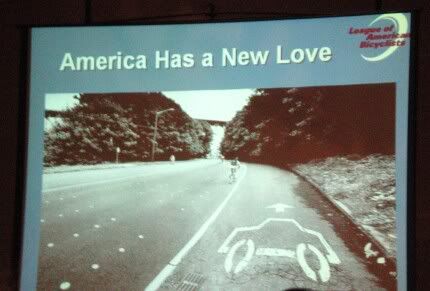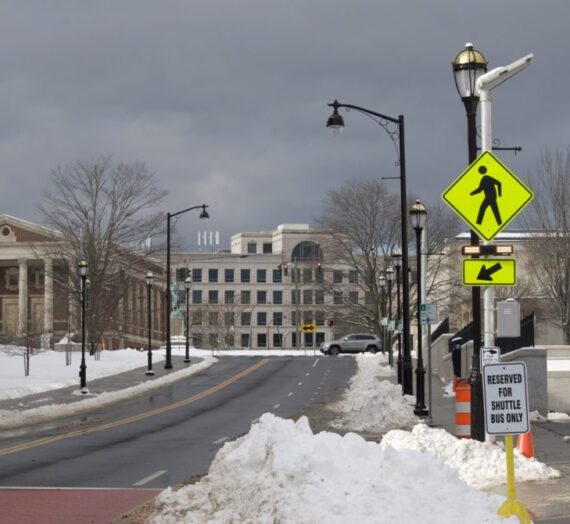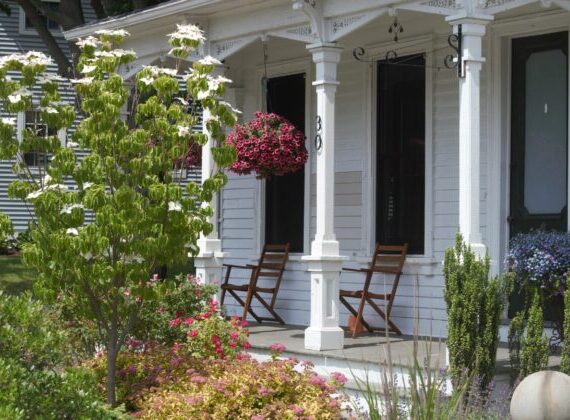 I had been warned that the Bushnell Theatre lacks bicycle parking. I rode over anyway. It was a bicycle symposium. Was I going to drive to that? I approached the building from a side street, thinking that maybe a rack was located on the side where most patrons would not enter. When I came to the Capitol Avenue entrance, I shrugged my shoulders and accepted that I would have to be the jerk who locks her bicycle to an ornate fence. Just then, an older Bushnell employee opened the door and called out “Excuse me!” I took a deep breath, expecting to get hollered at about destroying property. Instead, what I got was a jolly invitation to wheel my bicycle right into the lobby, where it would be among other bikes, as well as under his watchful eye. His words: “I don’t see why not!” I don’t know if this is how the Bushnell typically deals with bicycles on their property, but I like the approach and wish more businesses and venues were that accommodating.
I had been warned that the Bushnell Theatre lacks bicycle parking. I rode over anyway. It was a bicycle symposium. Was I going to drive to that? I approached the building from a side street, thinking that maybe a rack was located on the side where most patrons would not enter. When I came to the Capitol Avenue entrance, I shrugged my shoulders and accepted that I would have to be the jerk who locks her bicycle to an ornate fence. Just then, an older Bushnell employee opened the door and called out “Excuse me!” I took a deep breath, expecting to get hollered at about destroying property. Instead, what I got was a jolly invitation to wheel my bicycle right into the lobby, where it would be among other bikes, as well as under his watchful eye. His words: “I don’t see why not!” I don’t know if this is how the Bushnell typically deals with bicycles on their property, but I like the approach and wish more businesses and venues were that accommodating.
The symposium was sponsored by the Bushnell Theatre, Central Connecticut Bicycle Alliance, and the Capitol Region Council of Governments. Tom Maziarz of CRCOG and Anne I. Hayes of Central CT Bicycle Alliance gave a little background on their respective organizations, but the spotlight quickly went to Andy Clarke. The President of the League of American Bicyclists delivered a talk, “Bicycle Friendly Communities: The Benefits and a Road Map for Success.”
One of the League of American Bicyclists’ programs is called Bicycle Friendly America. Under this program, applications can be submitted for the designation of Bicycle Friendly Business, Bicycle Friendly Community, and Bicycle Friendly State. There is a four-tier ranking system: bronze, silver, gold, and platinum. Where a community ranks is determined by criteria found on this scorecard and on the application. The applicants are asked about engineering, education, encouragement, enforcement, and evaluation. According to the League’s Yearbook:
Every city, awarded or not, receives feedback from the League’s panel of reviewers, which includes local cyclists and nationally recognized experts. This feedback acknowledges the good things that are present in the community and presents a roadmap of proposed policies, programs, and projects to move the community forward.
Clarke explained that the ranking system is “not scientific […] but it’s robust.”
So, where does Hartford rank?
It doesn’t.
And neither does any other community in Connecticut.
Connecticut is ranked “44 out of 50” overall for bike friendliness; Washington is ranked first and Alabama is ranked last. The ranking was determined by categories: legislation, policies and programs, infrastructure, education, evaluation, and enforcement. In the category of education, our state is ranked dead last. The site states that there is currently no state funding for bicycle education. We’re ranked #17 for legislation and #27 for policies and programs, but #42 for infrastructure, #43 for evaluation, and #41 for enforcement.
The top ranked cities in the country are Boulder, CO, Davis, CA, and Portland, OR. To provide some perspective, Boulder’s goal is to have a 25% single occupancy vehicle rate. The League’s Yearbook states that Boulder has:
Separate snow removal crews [that] begin plowing the city’s multi-use paths at exactly the same time that other crews are plowing city streets. At least 95 percent of arterial streets have bike lanes or trails on them. […] The expansive bike network has even led local real estate agents to showing homes by bike in an effort to highlight the location’s proximity to the network.
Another top-ranking city, Portland, has 60% of its downtown police officers patrolling on bicycle! In 2008, it was recorded that nearly 17,000 trips (by bike) are made over the Willamette River bicycle bridges in Portland daily. Clarke also mentioned that Portland has one of the lowest household expenditures on transportation in the nation.
Clarke reminded the audience, when gushing about Copenhagen, that just a few decades ago, the city was not anywhere near as bike friendly as it is today. Change is possible.


Brendan
So, these people rolled into town to disparage cycling Connecticut?
How helpful.
kerri provost
Actually, they did not critique CT at all in the talk. Some audience members might have bordered on that. Clarke stayed very focused on ways that communities can develop more thriving bicycle culture, but I did not want to step on any toes because I know that the Beat Bike Blog is going to discuss that in a post to come.